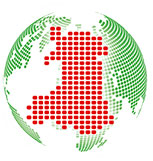The broader political context to this exhibition is that debates about independence in Scotland, Catalonia and here in Wales reflect debates in various territories, nations and regions in Europe and beyond.
Such debates are not new. Since 1945, calls for independence have led to the creation of many new states around the world, and such calls have increased in recent years. This is reflected in the growing number of referendums on independence held in recent decades. In the 2010s, for example, 15 independence referendums were held in places as diverse as Puerto Rico and Veneto, Southern Brazil and Bougainville, New Caledonia and Iraq. Some referendums were official and legally binding, others were not. These debates about independence are often controversial and can divide communities.
Referendums on independence have also been held in Scotland and Catalonia in the last decade.
The main political party campaigning for independence in Scotland is the Scottish National Party (SNP). It has viewed devolution as a step on the path towards their ultimate goal of Scottish independence. The SNP became a party of government in the Scottish Parliament in 2007, and after the 2011 Scottish Parliament election secured agreement from the UK Government to hold a referendum on Scottish independence. This referendum was held in 2014, with 55% voting against and 45% voting in favour of Scottish independence. But this result did not end the independence debate in Scotland. In the Brexit referendum held in 2016, the majority of voters in Scotland preferred to stay in the European Union. The fact that a majority in Scotland voted to remain in the EU in the Brexit referendum led the SNP to argue that Scotland was leaving the EU against the will of its people and that a second referendum on independence was necessary. So far, these calls for a second referendum have been rejected by the Westminster government.
The current wave of calls for independence in Catalonia emerged in the mid-2000s, as a result of failed attempts to give significant new powers to Catalonia’s regional parliament. After a series of huge pro-independence demonstrations, the Catalan government tried to hold a referendum on independence in 2017. However, this was declared illegal by the Spanish state. The Spanish government also suspended the operation of the regional parliament temporarily, and prosecuted pro-independence leaders involved in organising the referendum. Today, the pro-independence Republican Left of Catalonia governs the regional government and is trying to start negotiations with the Spanish government on holding a new legal referendum on Catalan independence.
In Wales, the main political party calling for Welsh independence is Plaid Cymru and in recent years it has called for a referendum on independence to be held. Calls for independence have also been pushed by a movement called Yes Cymru since the mid 2010s, which brings together people from across different political parties and organisations in Wales.


